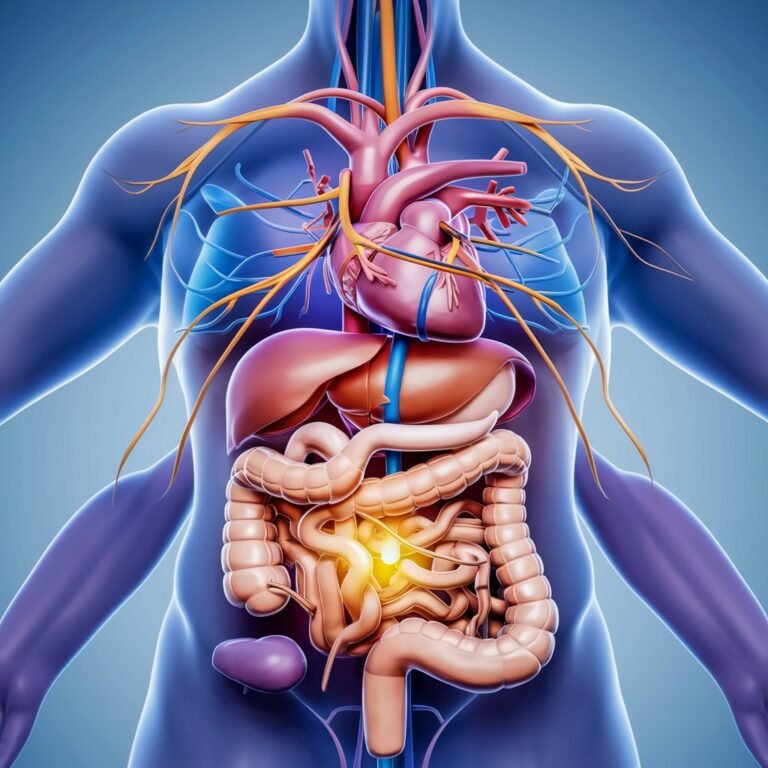Weight Management and Metabolism: A Comprehensive Guide
Introduction
Understanding metabolism is crucial for effective weight management. This comprehensive guide explores the intricate relationship between metabolism and weight, providing insights into how various factors influence our body’s energy processes and offering strategies for maintaining a healthy weight.
Key Insight
Metabolism is not just about burning calories; it’s a complex system that affects every aspect of our health, from energy levels to mood and longevity.
What is Metabolism?
Metabolism refers to all the chemical processes that occur within our bodies to maintain life. These processes include converting food and drinks into energy, building and repairing tissues, and eliminating waste products. The rate at which these processes occur is known as the metabolic rate.
There are two main components of metabolism:
- Catabolism: The breakdown of complex molecules into simpler ones, releasing energy.
- Anabolism: The synthesis of complex molecules from simpler ones, requiring energy.
Did You Know?
Your brain accounts for about 20% of your total daily energy expenditure, despite only making up about 2% of your body weight!
Factors Affecting Metabolism
Several factors influence an individual’s metabolic rate:
- Age: Metabolism typically slows down with age.
- Gender: Men generally have a higher metabolic rate than women due to greater muscle mass.
- Body composition: Muscle tissue burns more calories than fat tissue.
- Genetics: Some people naturally have a faster or slower metabolism.
- Physical activity: Regular exercise can boost metabolic rate.
- Hormones: Thyroid hormones, for example, play a crucial role in regulating metabolism.
- Diet: What and when you eat can affect your metabolic rate.
- Environmental temperature: Extreme cold or heat can temporarily boost metabolism as the body works to maintain core temperature.
- Sleep quality: Poor sleep can negatively impact metabolic rate and hormonal balance.
- Stress levels: Chronic stress can alter metabolism through hormonal changes.
Metabolism and Weight
While metabolism plays a role in weight management, it’s not the only factor. Weight is primarily determined by the balance between calories consumed and calories burned. However, a slower metabolism can make it more challenging to maintain or lose weight.
Factors Influencing Weight Management
Important Note
While we often focus on increasing metabolism to lose weight, it’s equally important to consider the quality of the calories we consume and our overall lifestyle habits.
Strategies for Boosting Metabolism
While some factors affecting metabolism are beyond our control, there are several strategies we can employ to optimize our metabolic rate:
- Build muscle: Increasing muscle mass through strength training can boost resting metabolic rate.
- High-Intensity Interval Training (HIIT): This type of exercise can increase metabolism for hours after the workout.
- Stay hydrated: Drinking water can temporarily boost metabolism.
- Eat protein-rich foods: Protein has a higher thermic effect compared to fats and carbohydrates.
- Get enough sleep: Lack of sleep can negatively impact metabolism and hormones related to hunger and fullness.
- Manage stress: Chronic stress can lead to hormonal imbalances that affect metabolism.
- Drink green tea or coffee: The caffeine in these beverages can provide a short-term boost to metabolic rate.
- Spice up your meals: Some studies suggest that spicy foods can temporarily increase metabolism.
- Stand up more: Sitting for long periods can slow down metabolism, so try to stand or move around regularly.
- Get enough vitamin D: Low levels of vitamin D have been associated with slower metabolism.
Exercise and Metabolism
Regular physical activity is one of the most effective ways to boost metabolism. Exercise increases calorie burn not only during the activity but also for hours afterward through a process called excess post-exercise oxygen consumption (EPOC).
Different types of exercise affect metabolism in various ways:
- Aerobic exercise: Improves cardiovascular health and burns calories during the activity.
- Strength training: Builds muscle mass, which increases resting metabolic rate.
- HIIT: Provides a significant metabolic boost that can last for hours after the workout.
Calorie Burn by Exercise Type (30 minutes)
Pro Tip
Incorporate a mix of different exercise types into your routine for optimal metabolic benefits. Aim for at least 150 minutes of moderate-intensity aerobic activity or 75 minutes of vigorous-intensity aerobic activity per week, along with muscle-strengthening activities at least twice a week.
Nutrition and Metabolism
What we eat plays a crucial role in our metabolic health. Here are some key nutritional considerations:
- Protein: Has a high thermic effect, meaning the body burns more calories digesting it compared to fats and carbohydrates.
- Complex carbohydrates: Provide steady energy and help regulate blood sugar levels.
- Healthy fats: Essential for hormone production and nutrient absorption.
- Fiber: Aids digestion and helps maintain stable blood sugar levels.
- Vitamins and minerals: Play crucial roles in various metabolic processes.
The timing of meals can also affect metabolism. Some studies suggest that eating smaller, more frequent meals throughout the day can help keep metabolism active, while others advocate for intermittent fasting as a way to improve metabolic health.
Thermic Effect of Macronutrients
Metabolic Boosting Foods
Consider incorporating these metabolism-friendly foods into your diet: green tea, chili peppers, lean meats, lentils, eggs, Greek yogurt, berries, and whole grains.
Sleep and Metabolism
Adequate sleep is crucial for maintaining a healthy metabolism. Lack of sleep can lead to:
- Increased production of the stress hormone cortisol
- Decreased production of growth hormone, which is important for tissue repair and metabolism
- Alterations in hunger hormones, leading to increased appetite and cravings
- Reduced insulin sensitivity, affecting blood sugar regulation
Aim for 7-9 hours of quality sleep per night to support optimal metabolic function.
Sleep Hygiene Tips
Establish a consistent sleep schedule, create a relaxing bedtime routine, limit screen time before bed, and ensure your sleeping environment is dark, quiet, and cool for better sleep quality.
Stress and Metabolism
Chronic stress can have negative effects on metabolism:
- Increased cortisol levels, which can lead to increased appetite and cravings for high-calorie foods
- Disrupted sleep patterns, affecting hormonal balance
- Reduced motivation for physical activity
- Potential impact on gut health, which can affect nutrient absorption and metabolism
Managing stress through techniques such as meditation, yoga, or regular exercise can help maintain a healthy metabolism.
Quick Stress-Busters
Try deep breathing exercises, progressive muscle relaxation, or a short walk in nature to help manage stress levels throughout the day.
Medical Conditions and Metabolism
Several medical conditions can affect metabolism, including:
- Hypothyroidism: An underactive thyroid gland can slow down metabolism.
- Cushing’s syndrome: Excess cortisol production can lead to weight gain and metabolic disturbances.
- Polycystic ovary syndrome (PCOS): Can affect insulin sensitivity and hormonal balance.
- Diabetes: Impacts how the body processes glucose, affecting overall metabolism.
- Metabolic syndrome: A cluster of conditions that increase the risk of heart disease, stroke, and diabetes.
If you suspect a medical condition is affecting your metabolism, consult with a healthcare professional for proper diagnosis and treatment.
Frequently Asked Questions
Conclusion
Understanding metabolism is key to effective weight management and overall health. While some factors affecting metabolism are beyond our control, many aspects can be influenced through lifestyle choices. By incorporating regular exercise, maintaining a balanced diet, getting adequate sleep, managing stress, and addressing any underlying medical conditions, we can optimize our metabolic health and achieve our weight management goals.
Remember that sustainable weight management is a long-term process that involves creating healthy habits rather than pursuing quick fixes. Consult with healthcare professionals or registered dietitians for personalized advice on optimizing your metabolism and achieving your health goals.
Final Thoughts
Metabolism is a complex and dynamic system. By focusing on overall health and well-being rather than quick fixes, you can create a sustainable approach to weight management and metabolic health that will serve you well throughout your life.

